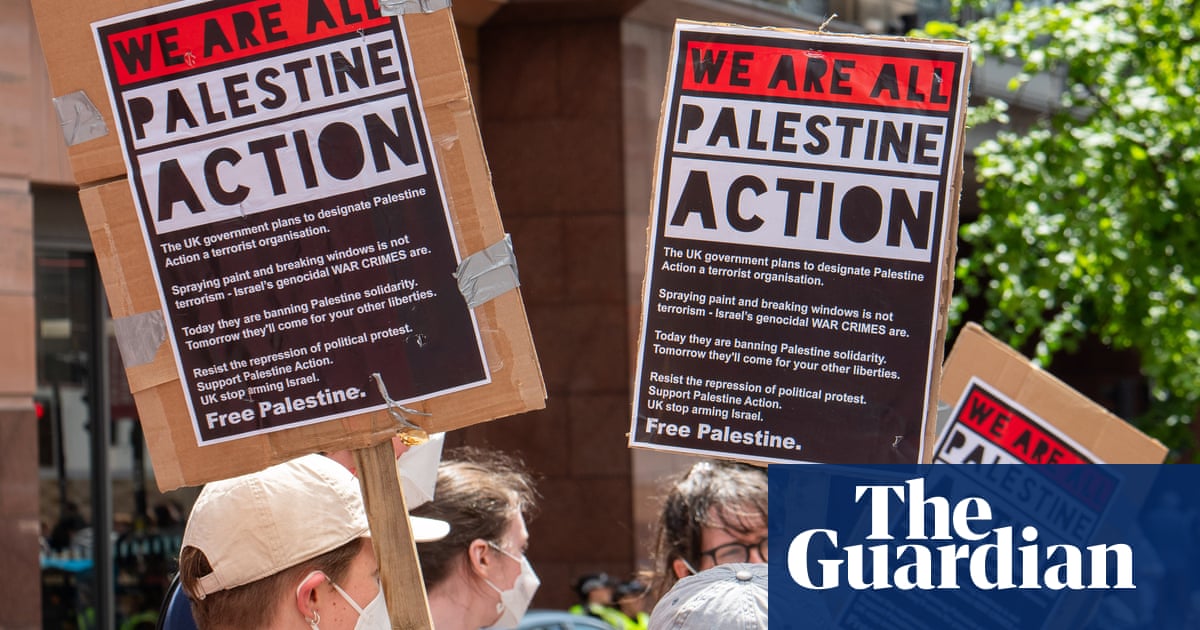Palestine Actionhas been granted an urgent high court hearing on Friday to try to prevent a banning order against it from coming into effect.
An order is due to be laid before parliament on Monday that would proscribe the group as a terrorist organisation, making being a member of or inviting support for Palestine Action a criminal offence carrying a maximum sentence of 14 years in jail.
The move,announcedby the home secretary, Yvette Cooper, last week, would place Palestine Action alongside the likes of al-Qaida, Islamic State and National Action. The move has been criticised as draconian by protest groups, civil liberties organisations and various politicians.
At a short-notice hearing at the high court on Monday, it emerged that Huda Ammori, a co-founder of Palestine Action, is to be given an opportunity to apply for “interim relief” with respect to the proscription order.
David Blundell KC, representing the Home Office, said the plan had been for the order to be debated in parliament this week and then signed on Friday to come into effect on Saturday.
But the judge Mr Justice Chamberlain said that if an application by Palestine Action for interim relief on Friday was successful it would “have the effect of suspending its [the order’s] operation”.
Ammori’s lawyers contend there has been “a failure of the duty to inform the claimant of the basis on which it is proposed to restrict her rights through proscription” and to “afford her the opportunity to make representations before any decision to restrict her rights”.
The submission also states that while “extensive consultation has taken place with the Israeli government and arms companies … no opportunity has been provided for other groups affected or concerned by the proposal to proscribe Palestine Action, including Liberty, Amnesty International and other civil society organisations”.
Liberty, Amnesty International and the European Legal Support Center have submitted supporting witness statements for Ammori’s case alleging the unlawful misuse of anti-terror measures to criminalise dissent, Palestine Action said.
Ammori said: “The court’s decision to grant an urgent hearing this week is indicative of the vital importance of what is at stake in this case, including the far-reaching implications any proscription of Palestine Action would have on fundamental freedoms of speech, expression and assembly in Britain.
“This is the first attempt in British history to criminalise direct action, political protest, as terrorism, mimicking many authoritarian regimes around the world who have used counter-terrorism to crush dissent. This would set an extremely dangerous precedent, with repressive impacts right across the Palestine movement.
“Spraying red paint on war planes is not terrorism. Causing disruption to the UK-based arms factories used by Israel’s largest weapons firm, Elbit Systems, is not terrorism.”
Palestine Action says it uses direct action to seek to prevent serious violations of international law by Israel against the Palestinian people.
Cooper took the decision to ban it under anti-terrorism laws three days after the group claimed anaction against military aircraftat RAF Brize Norton in Oxfordshire. Five people have been arrested in connection with the incident.
Cooper said there had been “a long history of unacceptable criminal damage committed by Palestine Action”.
Another hearing has been scheduled for 21 July when Ammori would seek permission for a judicial review to argue that the proscription order should be quashed.
